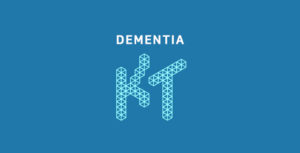
The DementiaKT Hub: translating research into practice
The DementiaKT Hub - a new one-stop online destination for the latest research-based dementia resources involving DCRC expertise

Breaking through the no time for training barrier is the major driver behind the development of Dementia Training Australia’s new, cutting edge Responsive Behaviours (RB) Toolkit.
DTA currently uses different terms for behaviour. We will be progressively moving to the term Changed Behaviour in all our content.
Combining animations, videoed role-plays and interactive activities, the topics have been specifically designed to be delivered in 15-20 minute chunks, during staff huddles, handovers, or as part of longer meetings. A big advantage is that they can be delivered in any order, as part of a series or in a one-off session.
The new Responsive Behaviours Toolkit has been developed by DTA’s Queensland University of Technology (QUT) team, led by DTA director, Professor Elizabeth Beattie.
Professor Beattie says the resource is a direct response to requests from health professionals for education solutions that combine brief, ‘bite-sized’ training sessions in time-poor environments, with practical approaches to the responsive behaviours expressed by people living with dementia in their care.
“Unlike longer training sessions, ‘micro-learning’ approaches like this use use quick reads, short videos and other engagement strategies to capture attention and drive retention of the information,” said Professor Beattie.
“To be really effective, the product must not only reflect best practice knowledge of the subject and the evidence, but a highly creative pedagogical approach.
“Our team, including Sandra Jeavons and Liz Miles and others*, collaborated on the Toolkit from the concept development and creation of storylines, right through pre production, filming, acting, production, user testing and the product launch,” Professor Beattie said.


Professor Beattie says time is often the biggest enemy for busy RNs and clinical leads in contemporary care settings, and many of the traditional forms of education and training are simply not practical options.
“We developed this toolkit approach in consultation with health professionals and user groups, including role playing the many scenarios, to ensure that it meets their actual needs, in their real day to day contexts, while also being really interesting and engaging,” she said.
Toolkit topics cover:
The toolkit’s suggested follow-up activities aim to help consolidate learning and promote real practice change.
“The learning and training ‘tools’ in this toolkit focus on best practice approaches with an emphasis on the personbehind the behaviour, as well as specific responsive behaviours and psychological symptoms,” said Professor Beattie.
“It is a breakthrough option for many individuals and organisations and we are quite excited about seeing the results,” she said.
To find out more about the Responsive Behaviours Toolkit, visit: dta.com.au/resources/responsive-behaviours-toolkit
“I’m sure these short sessions will make a difference especially when getting staff together, off the floor, is so difficult in these times”
– Brett Englart, Consumer Directed Care Champion, St Vincent’s Care Services
* DTA’s project team at QUT, under the leadership of Professor Elizabeth Beattie, includes, Sandra Jeavons, Liz Miles, Katy Wyles and Denise Edwards.

The DementiaKT Hub - a new one-stop online destination for the latest research-based dementia resources involving DCRC expertise

Giving Voice Chorus is a choir program for people with dementia and their care partners.